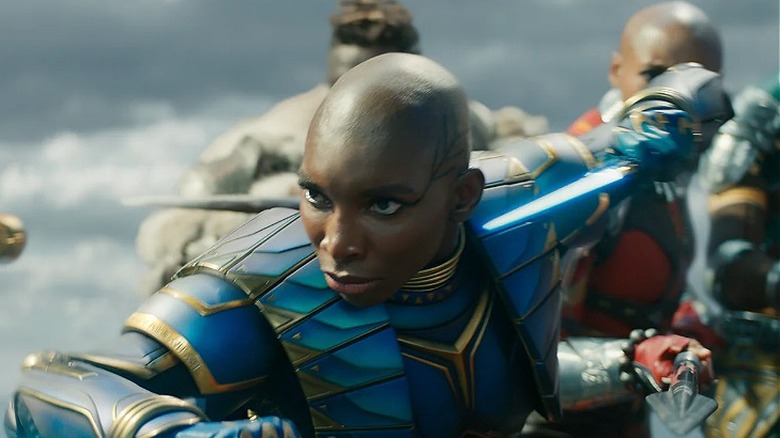Why Black Panther: Wakanda Forever Could Be Banned In China
In 2018, after bursting onto the scene with a $200 million domestic debut and ultimately drawing in roughly $1.3 billion worldwide, Marvel's "Black Panther" became the second-highest-grossing movie of the year (topped only by another MCU mega-hit, "Avengers: Infinity War," per Statista), and the 14th highest-grossing movie ever made (via CNBC). Now, less than one day into its anticipated opening weekend, "Black Panther 2: Wakanda Forever," is well on its way to matching its predecessor's impressive box office prowess.
However, despite raking in $28 million during Thursday's preview, and appearing primed, as Deadline noted, ready to hit its projected $175 to $200 million domestic opening, its ability to meet and/or surpass "Black Panther's" worldwide showing could be impeded by the potential loss of a key market. Thanks to Deadline, we know Disney was able to confirm, despite difficulties early on, a theatrical release in France by simply moving the film's streaming debut there, it's looking less and less like the anticipated sequel will land on the big screen in China — the country responsible for $66.5 million, or just over 5%, of "Black Panther's" worldwide ticket sales (via CGTN).
China's censors are likely to ban yet another Marvel movie
In fall 2020, China officially overtook North America's decades-long hold on the motion picture industry when its $1.988 billion in ticket sales surpassed the latter's $1.937 billion, in large part thanks to the gap between the two markets' response to the COVID-19 pandemic (via The Hollywood Reporter). Though North America has since reclaimed its movie market crown, as reporter Erich Schwartzel explores at length in "Red Carpet: Hollywood, China and the Global Battle for Cultural Supremacy," China's enormous market — and increasingly strict censors — are still playing a major role in what American filmmakers will and will not put in their movies.
As Schwartzel explained in a recent interview with NPR, "When a [foreign] movie has finished filming and it is ready for release [in China], a copy of it is sent to Beijing to the Ministry of Propaganda...obviously anything that might concern Tibet or Chinese history or Mao is going to be off the table [but] even a superhero movie might be watched for certain scenes that contain images or themes they don't want the Chinese people to see. And it ranges from the cosmetic to the thematic."
With regard to "Wakanda Forever," the issue appears to be thematic. According to The Hollywood Reporter, sources in the industry abroad say the film is likely to be dismissed for the same reason "Thor: Love and Thunder" was believed to be rejected: its depiction of openly gay characters.
Wakanda Forever should do just fine anyway
In "Thor: Love and Thunder," even the (ultimately, fairly minimal, per Collider) queer representation was enough to see it banned by a number of countries, including Kuwait and Malaysia, and now it appears "Wakanda Forever" will become the seventh Marvel movie to be banned in China.
In the film, Michaela Coel's Aneka is in a relationship with Florence Kasumba's Ayo — a plot point Coel told Vogue ultimately sold her on the character. Though the relationship between Ayo and Aneka is made clear in only the briefest of moments (read: an affectionate kiss on the forehead), it's a moment Disney caved in and cut for the film's release in Kuwait (via The Hollywood Reporter). At this stage, however, it looks like no amount of post-production, anti-LGBTQ+ censorship (e.g., erasing Freddy Mercury's sexuality in "Bohemian Rhapsody," as 20th Century Fox did to secure the "biopic's" Chinese release in 2019, per BBC) will be enough to help the film finds its way into the Chinese market. Since China typically yays or nays a foreign film's release one-to-two months in advance (per THR), the odds of "Wakanda Forever" getting to partake in the formidable market's ticket sales are probably slim to none.
Luckily, it looks like Marvel's only Certified Fresh film of the year will have little trouble on the international stage, even without the help of China. On Wednesday, the film drew in over $10 million in 17 material markets abroad (including 2.2 million from France and 1.4 million from South Korea), which should signal a global opening of "$325 million or more," according to The Hollywood Reporter.


